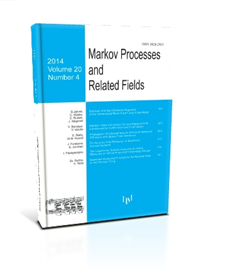How to Clean a Dirty Floor: Probabilistic Potential Theory and the Dobrushin Uniqueness Theorem
R. Fernandez, A.D. Sokal, T. de la Rue
2008, v.14, Issue 1, 1-78
ABSTRACT
Motivated by the Dobrushin uniqueness theorem in statistical mechanics, we consider the following situation: Let $\alpha$ be a nonnegative matrix over a finite or countably infinite index set $X$, and define the "cleaning operators" $\beta_h = I_{1-h} + I_h \alpha$ for $h$: $X \to [0,1]$ (here $I_f$ denotes the diagonal matrix with entries $f$). We ask: For which "cleaning sequences" $h_1,h_2,\ldots$ do we have $c \beta_{h_1} \cdots \beta_{h_n} \to 0$ for a suitable class of "dirt vectors" $c$? We show, under a modest condition on $\alpha$, that this occurs whenever $\sum_i h_i = \infty$ everywhere on $X$. More generally, we analyze the cleaning of subsets $\Lambda \subseteq X$ and the final distribution of dirt on the complement of $\Lambda$. We show that when $supp(h_i) \subseteq \Lambda$ with $\sum_i h_i = \infty$ everywhere on $\Lambda$, the operators $\beta_{h_1} \cdots \beta_{h_n}$ converge as $n \to \infty$ to the "balayage operator" $\Pi_\Lambda = \sum_{k=0}^\infty (I_\Lambda \alpha)^k I_{\Lambda^c}$. These results are obtained in two ways: by a fairly simple matrix formalism, and by a more powerful tree formalism that corresponds to working with formal power series in which the matrix elements of $\alpha$ are treated as noncommuting indeterminates.
Keywords: nonnegative matrix,spectral radius,probabilistic potential theory,discrete potential theory,balayage,Dobrushin uniqueness theorem
COMMENTS
Please log in or register to leave a comment

